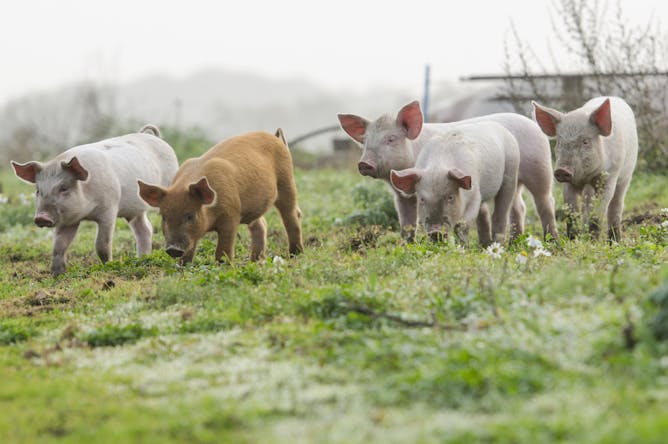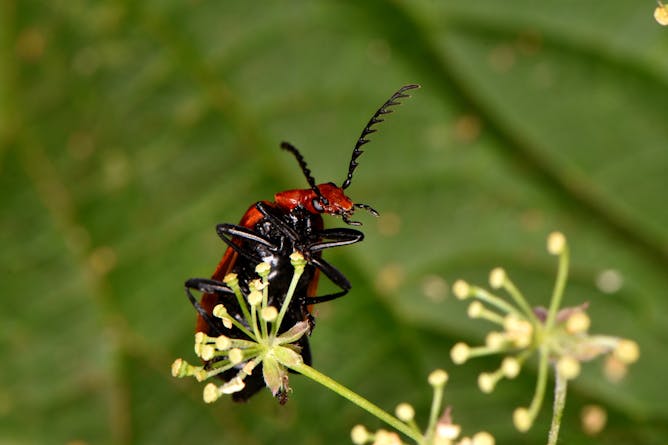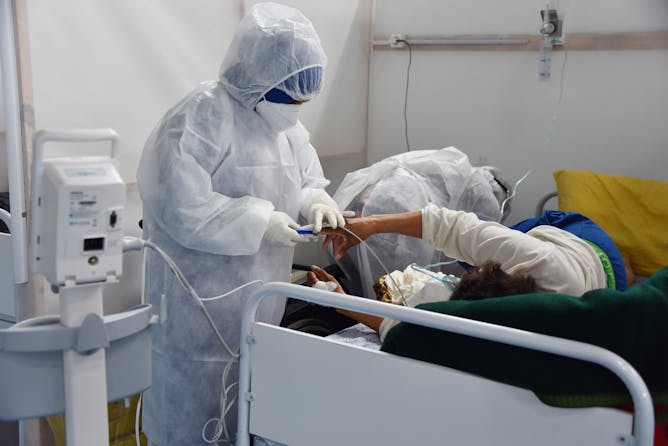|
The industrial production of meat has come in for increasing scrutiny in recent years. It’s an issue that’s in the spotlight again this week as the US Supreme Court considers a case that involves welfare standards for farm animals. The case has been brought by the pork industry which is challenging new conditions introduced in California for raising hogs, veal calves and egg-laying chickens, whose meat or eggs are sold in California. As David Favre explains,
the legal arguments are complex and span not just the welfare of animals but also rules governing trade between states.
The case before the court revolves around the size of gestational crates or stalls that sows are kept in. It’s common for the crates to be so small that the female pigs are unable to move around. These small stalls are banned in Europe as well nine other states in the US.
Relatively speaking, humans are well equipped to deal with extreme temperatures. New research suggests that insects may not be so lucky. Hester Weaving explains how she found that, facing rising temperatures, many insects will need to migrate to cooler locations in order to survive. And this could be bad news for humans. Insects attack crops and transmit disease.
|

David Favre, Michigan State University
Pork producers are challenging a California law that animal welfare advocates call the most important measure for farm animal protection in decades.
|

Hester Weaving, University of Bristol
Climate change is exposing animals to temperatures outside of their normal limits – a new study has found that insects have a particularly weak ability to adjust.
|
|
|
-
Robert Young, Lancaster University
The discovery that particles can be spookily connected has lead to a technological revolution.
-
Mary Prendergast, Rice University
Thousands of ancient genomes have been sequenced to date. A Nobel Prize highlights tremendous opportunities for aDNA, as well as challenges related to rapid growth, equity and misinformation.
-
Love Dalén, Stockholm University; Anders Götherström, Stockholm University
The Nobel Prize in physiology or medicine for 2022 has been awarded to Svante Pääbo, whose discoveries have been pivotal to the way we understand our evolutionary history.
-
Kenneth Keiler, Penn State
The US currently has only one antibiotic available to treat gonorrhea – and it’s becoming less effective.
-
Meredith Primrose Jones, RMIT University; Sascha-Dominik (Dov) Bachmann, University of Canberra
If the Nord Stream attacks were an act of sabotage, this shows how energy infrastructure can be strategically targeted as an act of ‘hybrid warfare’.
|
|

Matt McDonald, The University of Queensland
Remember hearing about COP26 in Glasgow last year? There’s a lot at stake in this year’s climate summit, so here’s your essential guide to prepare.
|

Dewald Schoeman, University of the Western Cape; Burtram C. Fielding, University of the Western Cape; Ruben Cloete, University of the Western Cape
The enigmatic envelope protein seems to hold the key to understanding why some human coronaviruses cause more severe disease than others.
|
|
|
-
Paula Keaveney, Edge Hill University
In her first party conference speech as prime minister, Liz Truss has emphasised that growth is the only solution.
-
Hylton Hollander, Stellenbosch University; Daan Steenkamp, Stellenbosch University; Roy Havemann, Stellenbosch University
An unfunded expansion of the social transfer system could lead to even worse economic outcomes — the medicine should not be worse than the disease.
|
|